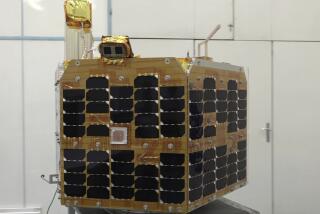South Korea launches satellite into orbit
- Share via
SEOUL -- In danger of falling behind in the space race on the Korean peninsula, the South Korean government announced Wednesday that it had successfully launched a rocket into space.
Pressure had been mounting ever since mid-December when communist arch-rival North Korea managed to launch a multi-stage rocket and put a satellite into orbit.
South Korea’s Satellite Launch Vehicle-1, also known as Naro, blasted off at 4 p.m. local time from a space center in Jeolla province on the southwestern coast.
“Five hundred forty seconds after the launch, Naro successfully separated the satellite,” South Korean Science and Technology Minister Lee Joo-ho said at a news briefing Wednesday. “After analyzing various data, we have confirmed that [the satellite] has been successfully put into orbit.”
Officials said the launch made South Korea the 13th country to get a satellite into orbit from its own territory. Iran on Monday announced that it had launched a monkey into space using its own technology.
The sky was clear and the weather had warmed up on Wednesday afternoon at the space center, where about 3,000 people gathered to observe the latest attempt to launch Naro. The crowd excitedly cheered and waved national flags during the countdown.
Two attempts to launch a space vehicle, in 2009 and 2010, ended in failures. The third attempt was to take place in October but was delayed due to a damaged rubber seal that caused a fuel leak. The next try came in November, but it was canceled 17 minutes before the rocket set to be launched due to a technical glitch.
The failures looked all the more embarrassing after the successful Dec. 12 launch of the Unha-3 rocket by North Korea, which has an economy less than one-twentieth the size of South Korea’s. What North Koreans have dubbed a “peaceful satellite launch” was a part of the legacy of North Korean leader Kim Jong Il, who died in December 2011.
The international community condemned North Korea as its rocket launch was suspected to be a cover for a test of ballistic missile technology.
Lee Sang-ryul, a South Korean scientist with the Korea Aerospace Research Institute, said the launches seven weeks apart were not comparable because the South Korean objective was purely scientific.
“The exterior of Unha-3 and Naro seems to be very much alike. It is about the same weight, the shapes are similar, and the fact that it puts a satellite in the orbit is the same. However, I believe North Korea’s purpose is not to develop a satellite launch vehicle but a weapons development,” South Korean television quoted Lee as saying Wednesday.
North Korea said earlier this month it would also conduct a nuclear test and that “the various satellites and long-range rockets that we will fire ... are targeted at the United States, the archenemy of the Korean people.”
Independent scientists say the North Korean satellite was not a complete success because its transmitter failed during the launch, but that it achieved a reasonably accurate orbit.
“Most countries when they launch their first satellite don’t get too close,” Jonathan McDowell of the Harvard-Smithsonian Center for Astrophysics said in a recent interview.
He added that South Koreans shouldn’t feel that North Korea has beaten them.
“It is difficult, but it is basically high-tech plumbing,” McDowell said. “It is not as sophisticated as creating the industrial base to make a Samsung monitor.”
South Korea’s Naro program began in 2002 with the help of Russian technology. Before Wednesday’s launch, the country had sent about 10 satellites into space, but they were all launched from foreign rockets overseas.
ALSO:
Egyptian general warns against continued unrest
Dozens of corpses found along river in Aleppo, Syria
Controversial Spanish doctor testifies in huge sports doping trial
-- Barbara Demick reported from Beijing.
More to Read
Sign up for Essential California
The most important California stories and recommendations in your inbox every morning.
You may occasionally receive promotional content from the Los Angeles Times.













